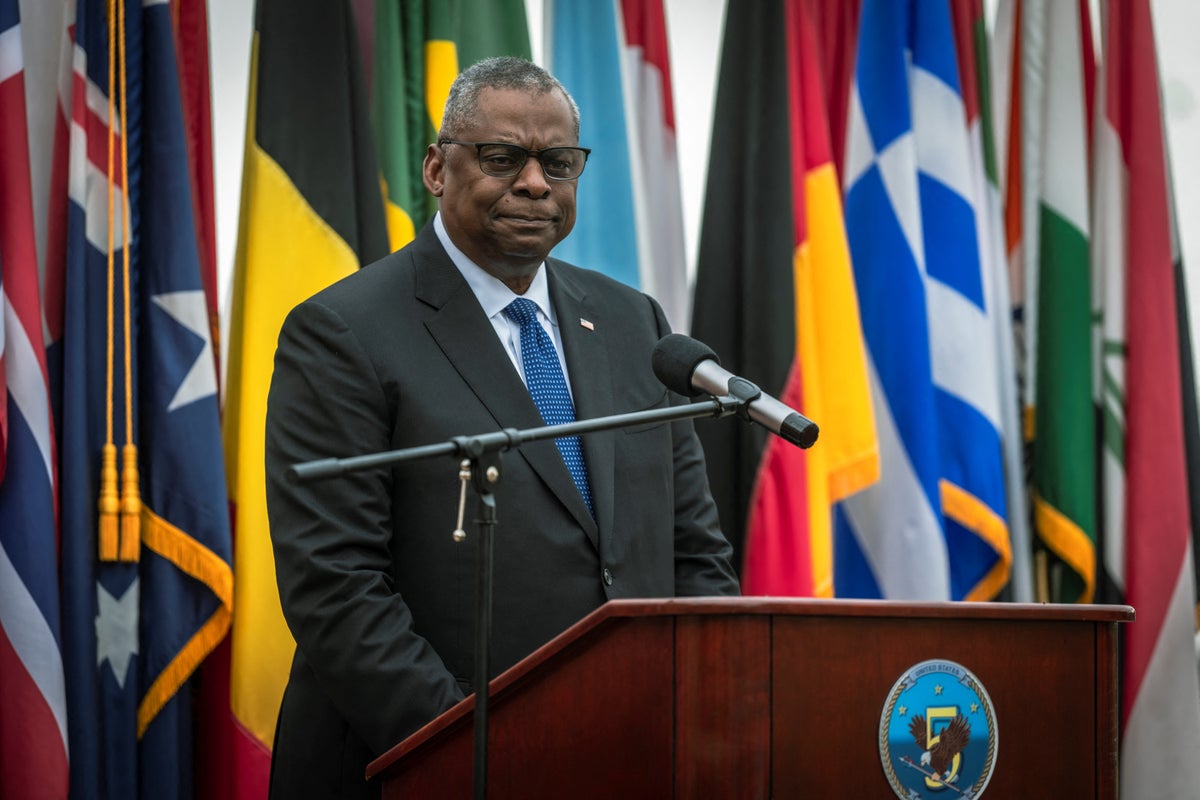
The White House and the Pentagon said they would review why president Joe Biden and some other top officials were kept in the dark about defence secretary Lloyd Austin's hospitalisation.
The alleged lack of transparency over Mr Austin's hospitalisation triggered a political furore, with Republicans, including former president Donald Trump, demanding Mr Austin‘s resignation. The Pentagon on Monday said Mr Austin had no plans to step down.
White House officials tried to justify the initial lack of information, saying that a key staffer was out with the flu.
The 70-year-old retired four-star general went to the hospital on 22 December for an "elective procedure" but one serious enough that Mr Austin temporarily transferred some of his authority to his deputy Kathleen Hicks. He went home the following day.
He was taken back to the Walter Reed National Military Medical Center by ambulance and put into intensive care after experiencing severe pain on New Year's Day. The White House was allegedly not informed that the defence secretary was in the hospital till 4 January in a stunning lack of transparency about the gravity of his illness.
The Pentagon on Monday said Mr Austin was no longer in intensive care and rejoined duties on 5 January, but it was not known when he would be released. He allegedly made calls to national security Advisor Jake Sullivan, General Erik Kurilla who heads US troops in the Middle East, and other senior national security leaders.
"There is no plan for anything other than for Secretary Austin to stay in the job," national security council spokesperson John Kirby said.
He added that the defence secretary's failure to inform his bosses would be subjected to a "hotwash" to see if procedures need to be changed.
Mr Austin said in a statement released on Saturday: "I recognise I could have done a better job ensuring the public was appropriately informed. I commit to doing better."
"But this is important to say: this was my medical procedure, and I take full responsibility for my decisions about disclosure."
Speaking to reporters on Air Force One, Mr Kirby said there is an "expectation" among members of president Biden's cabinet that if one of them is hospitalised, "that will be notified up the chain of command".
The defence secretary sits just below the president at the top of the chain command of the American military and his duties require him being available to respond to any national security crisis.
Pentagon press secretary Maj Gen Pat Ryder acknowledged that he and other public affairs and defence aides were informed on 2 January about Mr Austin's hospitalisation but did not tell the military service leaders or the security council until 4 January. "I want to offer my apologies and my pledge to learn from this experience, and I will do everything I can to meet the standard that you expect from us," he said.
Maj Gen Ryder said staff in the defence secretary's front office will review notification procedures, including whether regulations, rules or laws were broken, and will take steps to improve the notification process.
He said when Mr Austin was taken back to the hospital on 1 January, he was "conscious but in quite a bit of pain" and spent that evening undergoing tests and evaluation. The next day, "due to the secretary's condition and on the basis of medical advice", some authorities were transferred to Ms Hicks through a standard email notification that often does not provide the reason for transfer.
"There must be full accountability beginning with the immediate resignation of Secretary Austin and those that lied for him," Elise Stefanik, a Republican member of the House Armed Services Committee, said in a statement.
Mr Trump said the defence secretary should be fired for his "improper professional conduct and dereliction of duty".
"He has been missing for one week, and nobody, including his boss, Crooked Joe Biden, had a clue as to where he was, or might be," the 45th president wrote on Truth Social.
Meanwhile, Gen Eric Smith, the commandant of the Marine Corps, underwent an open heart surgery on Monday and is expected to return to office.
Gen Smith was hospitalised on 29 October after suffering a cardiac arrest near his home at the Marine Barracks in Washington. The Marines said Gen Smith underwent a successful surgery to repair a bicuspid aortic valve in his heart, which was the cause of his cardiac arrest.
"He is in good condition and continues to recover at the hospital among family members and his doctors," an official statement said. "Following his rehabilitation, Gen Smith will return to full duty status as Commandant."







